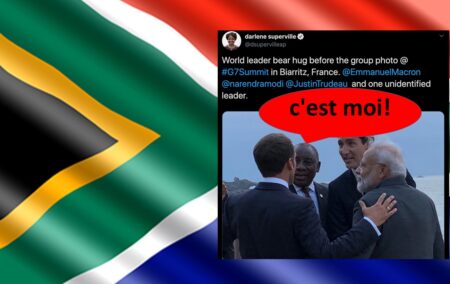The ‘outrage’ of a few South Africans on Twitter about the Associated Press caption that left President Cyril Ramaphosa unnamed reveals how skewed their perception of their country and its leader has become.
There was something appropriate, even poignant, about the Associated Press journalist tagging South Africa’s President Cyril Ramaphosa as an ‘unidentified leader’ in a photo of world leaders at the recent G7 summit in Biarritz, France.
Also in the photo were Emmanuel Macron (President of France), Narendra Modi (Prime Minister of India) and Justin Trudeau (Prime Minister of Canada) who were all identified by name. For all the fanfare that greeted his defeat of Jacob Zuma in December of 2017 and his later ascension to South Africa’s Presidency, there is ever less reason for anyone outside South Africa to know or care who Cyril Ramaphosa is.
If you turn to the second last page of The Economist, you come across a very useful list of economic indicators for 34 of the more important global economies. South Africa’s 2019 economic growth forecast is now the fourth lowest on that list. Its unemployment rate is the highest – and almost twice as high as that of Greece, which is second highest. Its inflation rate is the fourth highest. Its current account balance is tied for worst place. Its currency is the third worst performer over the past 12 months.
Much of the reason for this is the counterproductive policies of the South African government. Mr Ramaphosa was central to advocating higher minimum wages in the face of South Africa’s structural unemployment crisis.
He championed the expropriation without compensation message that has had such a chilling influence on investment. To his Cabinet he appointed a series of dogmatic leftist ideologues who regard the private sector with contempt – even by the standards of Jeremy Corbyn’s Labour Party or the full line-up of Democratic Party contenders, they’d be regarded as left-wing extremists.
He further championed the credit amendment legislation that seeks to expunge debt legally incurred to banks – and, in so doing, confirming suspicions that financial services firms are the real targets of expropriation legislation.
He and his health minister have advocated a national health insurance scheme that will centralise the purchasing and supply of medical services through the State when that same State is riddled with corruption and incompetence. The confidence-sapping consequences of such policies were seemingly driven home in Parliament ten days ago when Mr Ramaphosa could not give a straight answer on whether his government would support a prescribed assets strategy that would see the government raid pensions funds to stave off an externally financed bailout.
In the real world where people invest real money, these trends – and, later, policies – were at first met with disbelief, incredulity that is now slowly turning into resignation. The disbelief was born of the expectation that Mr Ramaphosa was a reformer who only needed a mandate before moving swiftly ahead with the structural reforms needed to turn the South African economy around.
When clients express frustration to us that he has not acted to drive those reforms, we ask them what reforms he had promised and which they had expected? Nothing beyond vague assurances were ever on the record and the image of ‘the great reformer’ was built by media and by people who, it turns out, were at times in the pay of Mr Ramaphosa’s campaign.
Who does the South African government think it is kidding? is the question asked these days in our offices, though seldom in the not very good local media. It cannot keep the lights on or grow the economy, yet it is going to nationalise the private healthcare industry in order to improve access to healthcare, raise pension funds to finance state-owned firms, and expropriate farms to improve food security and living standards.
The resignation that has now begun to set in is born of knowing exactly what the consequences are going to be for South Africa; the debt and deficit positions will worsen, downgrades are assured, the currency will weaken, economic growth will further stagnate with a risk of skipping into recession, and socio-economic circumstances will take their lead from the economic growth rate. And, in an economy that accounts for just 0.45% of global GDP, there is not much to see here other than the cliché of one promising emerging market that failed to live up to that promise.
Of course, for us who live here, the consequences are very real, but from abroad the impression created is of a strange little country led by a silly government – and thus the caption of an ‘unidentified leader’ becomes quite appropriate, while the ‘outrage’ of a few South Africans on Twitter reveals how skewed their perception of their country and its leader has become.
Frans Cronje is the CEO of the IRR.
If you like what you have just read, become a Friend of the IRR if you aren’t already one by SMSing your name to 32823 or clicking here. Each SMS costs R1.’ Terms & Conditions Apply.

